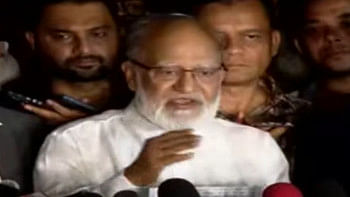But the fighter still remains
EVERY move Hasan Mashhud Chowdhury made in recent times moved multitudes of people to either cheers or distress: when he resigned as an adviser of the former president Iajuddin Ahmed-led caretaker government, and when he became ACC chairman and spear-headed the crusade against corruption.
Now with his resignation as ACC chairman, he has brought smiles to the faces of the corrupt, but dismayed the multitudes who once cheered his crusade against corruption.
HMC's resignation delighted the state minister for law, Quamrul Islam, among many others, who told reporters: "I am personally happy to know that Hasan Mashhud has resigned." He, however, added that Hasan Mashhud was neither removed nor asked to resign by the government. Well, let the people be the judge.
HMC's resignation was in the making when some lawmakers of both AL and BNP demanded his resignation. The prime minister then added momentum to his departure on February 4 when she told the parliament that the ACC should be reconstituted to ensure its accountability.
She asserted that ACC's past anti-graft drives were steered to shackle politicians. She observed that the commission itself was accused of being involved in corrupt practices during the CTG. Should we still believe that there was no pressure?
Since HMC's position in the ACC is a constitutional one, the government couldn't just boot him out unless he had committed a crime. But they could certainly creat an untenable situation for this honest and patriotic citizen, who takes no nonsense from anyone, and would therefore choose to leave his post rather than operate in a compromised environment.
In a graft-infested country like Bangladesh, there is no job that is more challenging and controversial than the job of chasing the corrupt people -- be they politicians, public servants, or businessmen. Then there are the politically appointed judges always ready to find a way out for the corrupt and even for those convicted by courts. During HMC's two years of anti-graft drives, the court failed to play a positive role in prosecuting the corrupticians and curbing corruption.
Under HMC's leadership, 165 people, including 70 politicians, were convicted of corruption. Of the 70 convicted, 41 were from BNP, 25 from AL, and 3 from JP. Almost all of the convicts and the accused -- mostly politicians -- have already been released on bail. There is hardly any chance that they would ever see the darkness of prison again.
Since February 22, 2007, the ACC has lodged 1,216 cases. Of these, 836 cases are under investigation, and 151 are in the process of being charge-sheeted. The HC has so far stayed the proceedings of 344 cases, including 151, which were under-trial. Trials of 370 cases, including 19 cases against 18 politicians, are pending.
Don't forget that the last two years' relentless anti-corruption drive was the first of its kind in the country's 38-year history. Because of the enormity of the task, some mistakes could have easily sneaked into anti-graft drive. But the net outcome is positive and the anti-corruption drive was on the right track.
Prominent civil society members termed unfortunate the resignation of HMC. Hafizuddin Khan, a former adviser to a CTG, expressed the feeling of all the honest citizens when he said: "It is frustrating that the ACC chairman who brought dynamism and gave life to the ACC by taking actions against corrupt people has resigned." Another former CTG adviser, Dr. Akbar Ali Khan echoed similar sentiment.
The are two challenges to PM Sheikh Hasina concerning anti-corruption: one, finding HMC's replacement who would be as fiercely and fearlessly non-partisan, and passionately committed to take the anti-corruption drive as a patriotic mission, and two, then to let the ACC prosecute all cases against AL, BNP and other politicians as expeditiously as possible without any pressure and fear of payback.
The people are agonising over both challenges and we hope the PM won't disappoint them with the suggestion that no AL politicians ever committed any corruption.

 For all latest news, follow The Daily Star's Google News channel.
For all latest news, follow The Daily Star's Google News channel. 



Comments